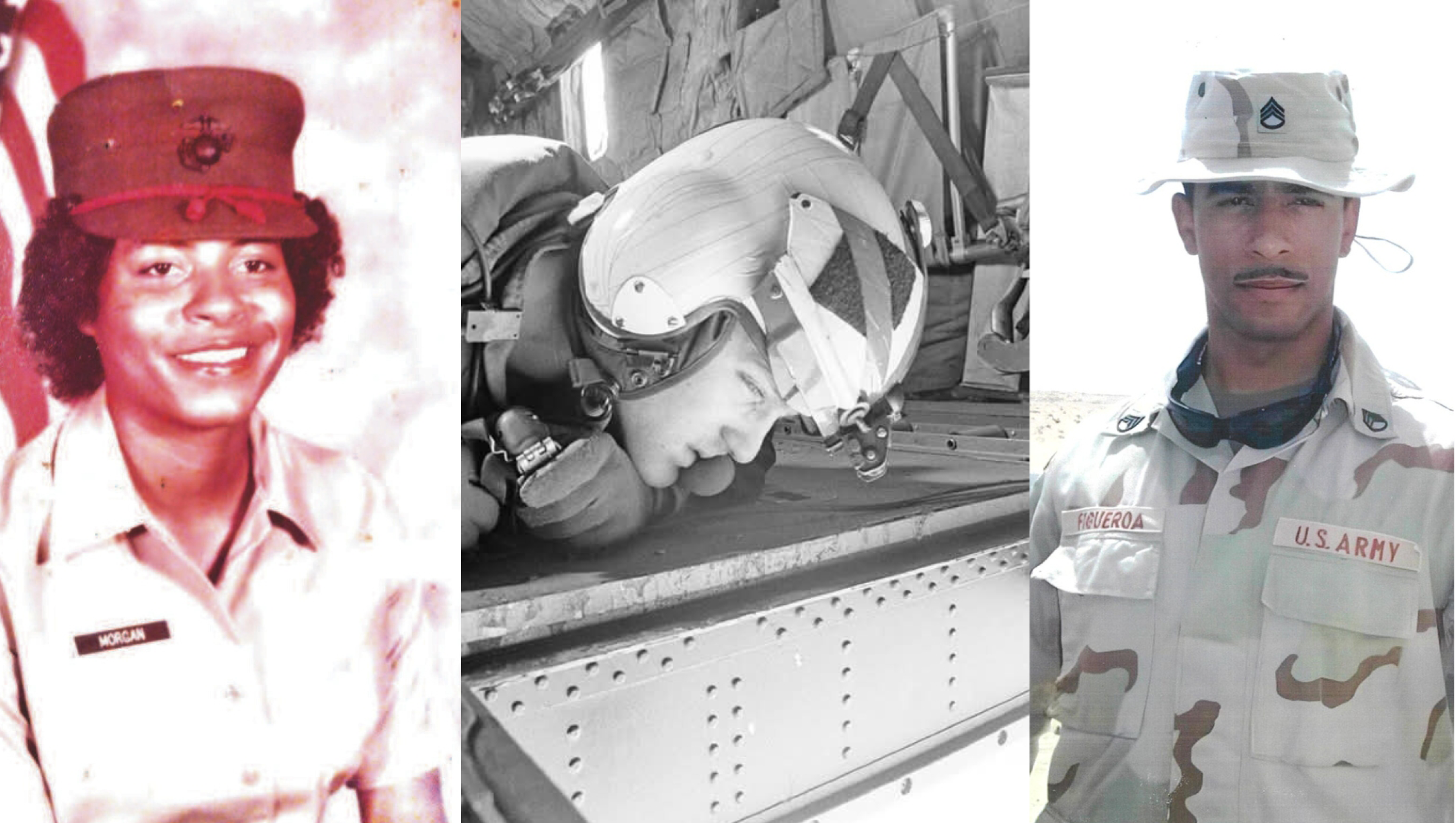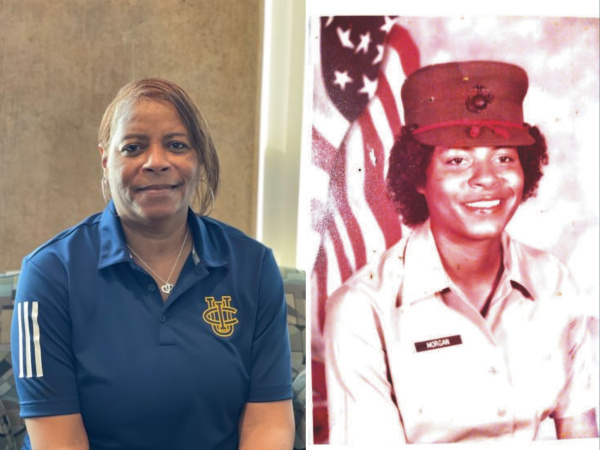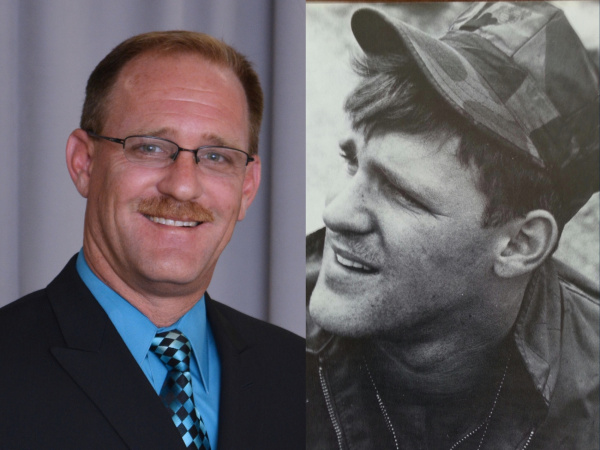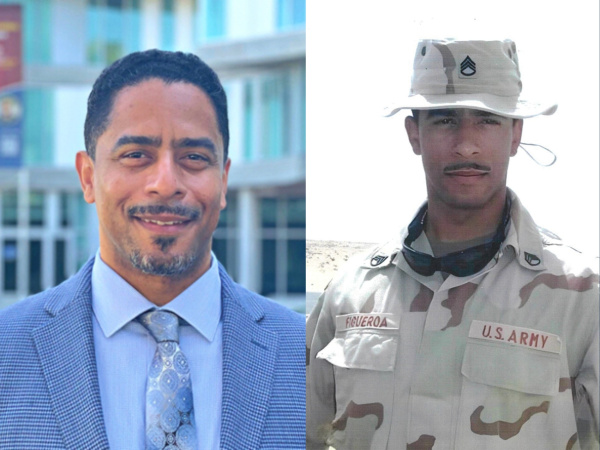
Service takes many forms at UC Irvine. Meet the School of Humanities staff members who, having dedicated years of their lives to the U.S. Armed Forces, bring a unique perspective on what it means to serve.
This Veterans Day, we recognized three staff members whose military experiences continue to shape their work and leadership within our campus community.

AJ Lipscomb, Advancement Office Administrative Specialist
Branch: United States Marine Corps (USMC)
What is a skill you learned as a member of the U.S. Armed Forces that translates to your role today (or to the work environments more generally)?
I wouldn’t call it a skill, but there was a phrase that was constantly repeated during my time in the marine corps. It was “hurry up and wait” where we were required to rapidly respond to commands and situations, but then realized there was a level of patience that was called upon as well because of the long wait times before execution of actions. I try to respond as quickly as possible to requests of me and have a very high level of patience when needed.
What is one thing you wish more people understood about military life or being a veteran?
It is an experience like nothing else in life that can be experienced by every citizen of this country. You are not only “serving your country" – but are willing to fight and give your life in its defense. Even though I had a specific admin MOS (Military Occupational Specialty) and the job was done Monday - Friday from 7:30 a.m. - 5 p.m., in the military are never really off duty – during the entire time of your enlistment, you are expected to respond to your unit whenever you are called, 24/7. To me, the only thing that has come close to this was realizing I would hold the label of being a “mother” for my entire life. For me, being a marine was not something I did — it is an experience that has contributed to who I am.

Colin S. Andrews, Director of Facilities and Space Planning
Branch and years served: United States Marine Corps, 4/20/1987 - 12/15/1995
Sergeant/Crew chief (Flight Engineer) CH-53E, Helicopter Crew Chief Instructor, Plane Captain Instructor, Night Systems Instructor, Turf Instructor, Crew Chief Evaluator, Plane Captain Evaluator, Collateral Duty Inspector.
Operations Participated in: Cold Winter 89 (above the Arctic circle Norway) Desert Shield/Desert Storm (Saudi Arabia/ Kuwait) Continue Hope/Quick Draw (Somalia) Deny Flight/Provide Promise (Bosnia/Former Yugoslavia) Support Democracy (Haiti) Joint Task force 129 (Central and South America)
Awards: Kuwait Liberation Medal (Kuwait), Kuwait Liberation Medal (Saudi Arabia), United Nations Medal, Navy Arctic Service Ribbon, Sea Service Deployment Ribbon (4) Humanitarian Service Medal (2), Southwest Asia Service Medal (3), Armed Forces Expeditionary Medal, Marine Corps Good Conduct Medal (2), Navy Unit Commendation, Meritorious Unit Commendation, Combat Action Ribbon, Navy Achievement Medal, Naval Air Crew Wings, Naval Combat Aircrew Wings. Special Award- Marine Corps Aviation Association Marine Aircrewman (Helicopter) of the Year- 2nd Marine Aircraft Wing (1993).
What is a skill you learned as a member of the U.S. Armed Forces that translates to your role today (or to the work environments more generally)?
I was privileged to serve with a very diverse group of individuals from different backgrounds, cultures and religions. I learned very quickly that we all had many things in common and by working together we could face and overcome any challenge presented before us. The School of Humanities has always felt like home to me as we embrace diversity, have respect for different opinions and look for ways to understand the world we live in and make it better. I also have a good understanding of the cultures and some of the languages that we teach about having been deployed to many of these areas and experiencing them first hand. In my current role, my understanding of how our building systems work can be directly related to how aircraft systems work. The logistics of deploying aircraft across the world has prepared me to understand the logistics of the many projects we undertake.
What is one thing you wish more people understood about military life or being a veteran?
We all have different reasons for joining the military, but all have a strong belief of being in service to others. All who have served made incredible sacrifices in many ways that are unseen to those not in service.

Tomas Figueroa, Assistant Dean
Branch and years served: U.S. Army, Staff Sergeant, 8 years of service
What is a skill you learned as a member of the U.S. Armed Forces that translates to your role today (or to the work environments more generally)?
Listening is a critical skill in the military. A leader is a good and attentive listener. It comes in handy in many situations, from following directions (perhaps it was a little easier to listen with drill sergeants screaming words at you, LOL), mechanical inspection, in the woods to understand your environment and in civil affairs listening to the members of the community whom you are working to collaborate. It's an area I find most important in my role, as a leader, to better understand the individuals I serve. In listening you understand their needs, their challenges, their motivation, their level of understanding, all of which to better lead your team.
What is one thing you wish more people understood about military life or being a veteran?
What we see on the screen is not always the true and actual experience of every military service member. We are unique in many ways, though our experiences may be similar. Our experience shaped us all in different ways to generate unique stories. If you know a veteran, see if they are willing to share their story.
Interested in reading more from the School of Humanities? Sign up for our monthly newsletter.
